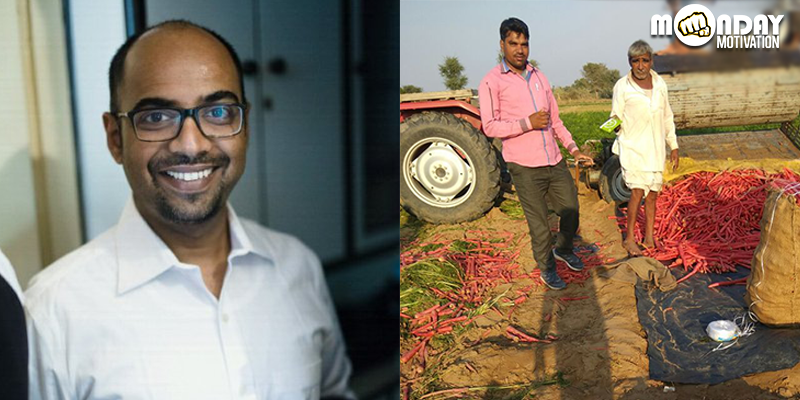This startup’s multiple market model aims to make agriculture a profitable business for farmers
Agribolo’s farm-to-fork, farm-to-mill and farm-to-warehouse model benefits the farmers and the ecosystem at large.

India is an agrarian economy yet, we are importers of most commodities. A primary reason could be the lack of technology intervention that can guide a farmer on sowing and price trends.
Inaugurating the 'World Food India' festival in New Delhi, Prime Minister Narendra Modi, on November 4 last year had said, “Food processing is a way of life in India. Simple, home-based techniques, such as fermentation, have resulted in the creation of our famous pickles, papads, chutneys and murabbas that excite both the elite and the masses across the world. However, more investment is required in contract farming, raw material sourcing and creating agri linkages. This is a clear opportunity for global chains. There are opportunities in post-harvest management, like primary processing and storage, preservation infra, cold chain and refrigerated transportation.”
Working on this premise and the need to create links in the agri-business model, Balaji Balaraman, 35, started Agribolo to create a market linkage opportunity that can become a farm to fork, farm to mill and farm to warehouse model for farmers and the ecosystem at large.
“India is poised to increase its food processing capacities; however the condition being our products must become as competitive as it is in other export markets. The primary necessities are to create multiple pre-processing or primary centres at the farm or village level and that will provide a basic value addition to the farmers and a opportunity to develop a cluster based model,” he says.

He believes that ground-level partnership and co-ownership model in the agri-sector — one that is inclusive, sustainable, and scalable — is the only way to bring farmers out of the vicious cycle of loans, crop failure and debts.
“We plan to achieve it through creating the decentralised ecosystem and looking at the farmer as an opportunity instead of a customer or a consumer, as this will enable us to create host of business opportunities to make the franchise model and the rural distribution model sustainable,” he adds.
The Mumbai-based startup is currently working with over 2.5 lakh farmers across India.
Addressing farmers’ needs and issues
Founded at the end of 2015 Agribolo, a farmer engagement platform was started with the aim to “energise the entire agri ecosystem.”
With a decade-plus experience in the agriculture sector the co-founders Balaji, Ajeet Godara and Arvind Godara were aware of the problems faced by farmers. This included information decimation, quality input procurement, market linkages, and access to tools, irrigation facilities and equipment that helps to till the soil.

Balaji believes that the existing agriculture ecosystem is disjointed where the farmer does not evolve through the value chain process. The farmer, he says, gets influenced at multiple levels either through the company’s field staff or dealer/distributor on the ground or is caught up in the herd mentality of what the fellow farmers are adopting.
“Due to this there is either excess production, or drop in production due to climate vagaries, pest attacks, or lack of financial support. This in turn makes the farmer dependent on the local moneylender and the mandi operators who has always exploited him. We need to develop an ecosystem that creates a level playing field for everybody and creates a link from farm level extension to final marketing of the produce. The farmer needs to have a right of when to sell, where to sell and at what price to sell,” he explains.
The co-founders wanted to disrupt this chain of agri trade that was controlled by the money-lender, where the farmers sold their produce to the mandi operator based on an unjustified method of judging the quality of the produce.

“This practice has made agriculture a six-monthly income generating occupation and that is why the farmer is made to believe that it is unviable,” Balaji says.
The Agribolo model
The farmer engagement platform, as envisaged by Balaji and his team, allows an individual to get an umbrella of services under one roof at his location and according to the season, relevance, demand, supply and in a timely and efficient manner.
The services are available annually to the farmer through various models including on-ground presence, toll free no, SMS services, mobile-based application, and Agribolo Kisan Seva Kendra.
The farmer is also provided the opportunity to partner with a business solution, available on the platform, that empowers him towards rural employment and social empowerment.

For instance, Agribolo engages and connects farmers with experts, NGOs, development institutions for training, capacity building and outreach programmes. The startup offers a platform to aggregate services in the form of farm mechanisation, plant nursery, protected cultivation, seed production, input demonstration, collateral management, financial inclusion, and local processing that could be co-owned and co-operated by the community at large.
Elaborating on Agribolo’s flagship Kisan Seva Kendra, Balaji says, “All services are available at one location and one network that builds in sustainability, creates an alternate market and thereby brings about disruption in the manner the business is operated on ground and benefits the ecosystem at large due to this value chain that is integrated through technology.”
Further, Agribolo also provides the farming community access to banks and development financial institutions with the aim to bring down the farm credit interest rate from 24 percent per annum to 10 percent.

The startup also helps to connect the farming community with the industries and corporates for both input and output sourcing.
“We also engage with farmers on other activities like milk collection, cattle feed, nursery development, water sheds, etc that brings in trust, and reliability,” he adds.
Rural engagement
The service offered by the organisation is centred around the franchise model through the “Agribolo Kisan Seva Kendra.” The franchise network is a “one-stop shop” for over 250 farmers, within a radius of 15-20 km, through which they engage with experts for advisory, input source, output supply, service aggregation and agri allied activities like seed production, nursery development, cattle feed supply, milk collection, and farm management.

“The most influential factor is the farmer believing in the model and taking the rural distribution model and running it as his own centre. Once the rural population believes in your story and wants to stay associated with the story and grow, it will automatically become a scalable and sustainable model,” Balaji says.
The entire model is on a profit sharing basis thus the franchisee is the partner in process that enables scale, adoptability, new product development and sustainability. Every franchise earns on an average of Rs 2 lakh per month. The team claims that there has been an instance where a farmer associated with their franchise, who has brought in over 600 farmers into the network, has earned a revenue of more than Rs 30 lakh in a month within a small radius of 10 km.

Agribolo takes care of last mile connectivity to the farmer by assisting the community in delivery of inputs, and procurement of the output from the farm gate. The team aggregates the produce from the farm and connects them directly to at least 550 APMC mandis.
“This brings down the supply chain cost to the bare minimum,” he explains.
Way forward
Currently boot-strapped, Agribolo is looking to raise around $6-8 million for its expansion plans.
The team hopes to create a sustainable value chain connect for farmers pan-India, in the near future. This will not only assist the farmer in achieving an improved yield at a reduced cost but also create an additional source of income through pre-processing, and other ancillary services.

“We are creating a parallel system which will be run by the farmer community, bringing in a sense of ownership. Cluster-based management then becomes a reality making input supply, output, aggregation, farm lending and service dissemination becomes possible and feasible,” Balaji shares.











